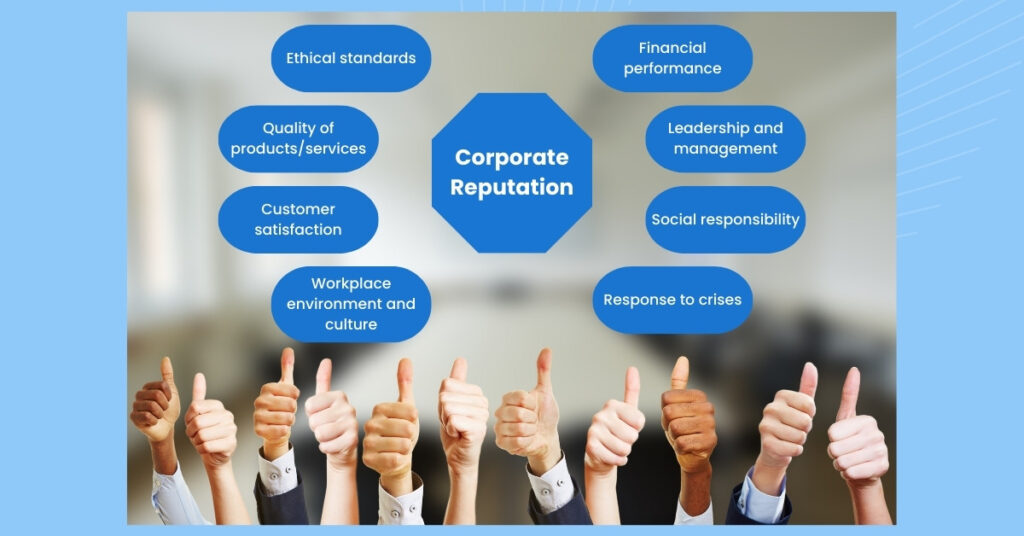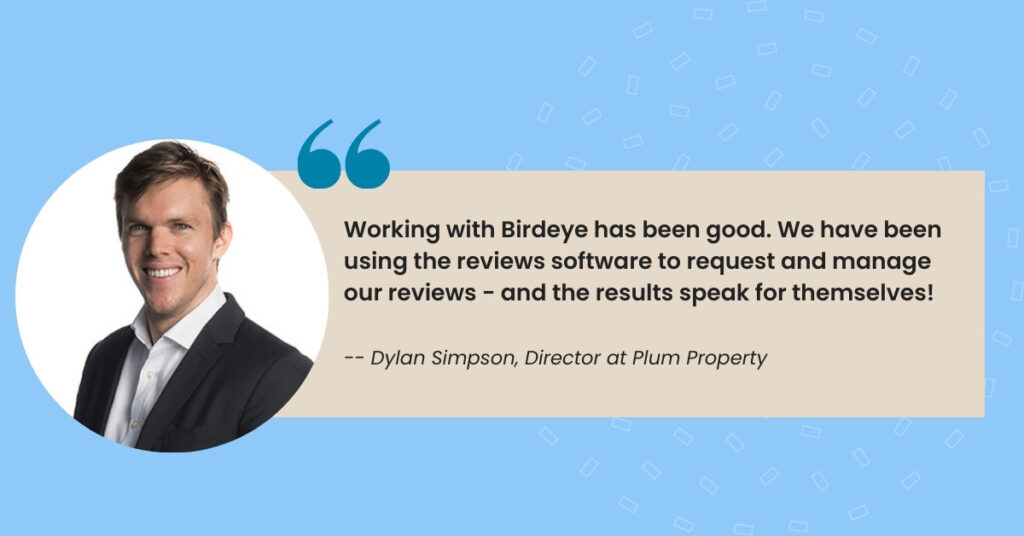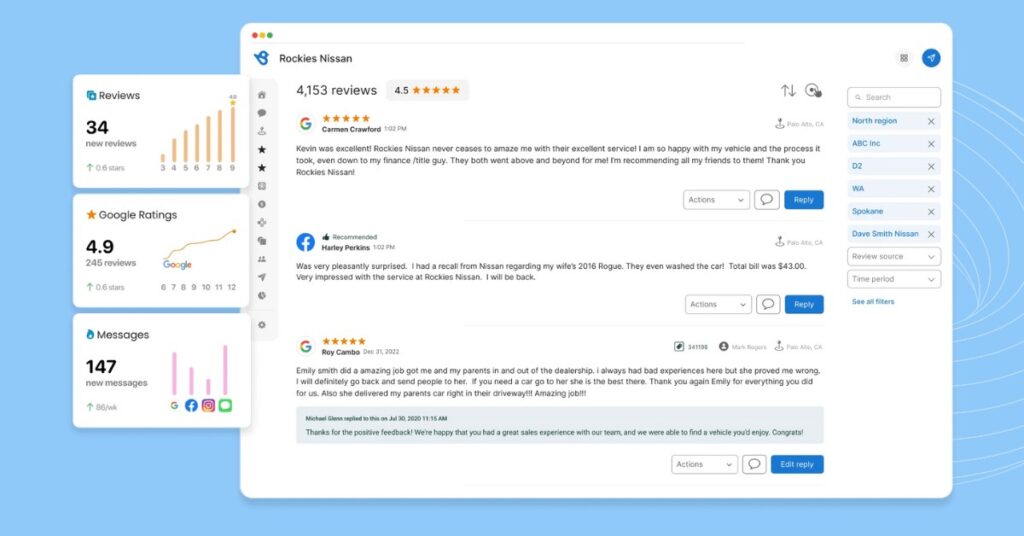We live in a world where one tweet, review, or post can tip the scales for your brand. And, as a Birdeye survey points out, about 92% of people read at least two reviews before choosing a business. So, it’s pretty clear that corporate reputation management (CRM) isn’t just about following trends. It’s the heartbeat of your brand, silently yet powerfully shaping how people perceive your business.
However, managing corporate reputation could be tricky for many companies. In the fast-moving online world, keeping up with what people think and say about your brand is a big challenge.
If you’re looking for ways to set up or streamline your business’s online reputation management strategy, look no further. In this blog post, we’ll uncover the essentials of corporate reputation management and teach you how it impacts your online presence.
Table of contents
- What is corporate reputation?
- What are the consequences of a poor corporate reputation?
- What is corporate reputation management?
- What are the key aspects of corporate reputation management?
- Why corporate reputation management is important for your business?
- How to build a strong corporate reputation management strategy?
- Top corporate reputation management service providers
- Measuring the effectiveness of your corporate reputation management
- FAQs about corporate reputation management
- Transform your corporate reputation management strategy with Birdeye
What is corporate reputation?
Corporate reputation is the overall impression of a company that its stakeholders, including customers, employees, investors, and the general public, have formed over time based on its actions, communications, brand perception, and the quality of its products or services.

The concept of corporate reputation encompasses a wide range of elements, such as:
- Ethical standards: This is all about whether your company is fair and responsible in its business dealings.
- Quality of products/services: Are the products and services you offer up to snuff? Do people think they’re getting their money’s worth?
- Customer satisfaction: This is about how well your company meets the needs and expectations of your customers.
- Workplace environment and culture: This includes whether your employees are happy, what your company’s work culture is like, and how your HR team does its thing.
- Financial performance: This is about the economic health and profitability of the company, which can sway investors and affect how the market sees you.
- Leadership and management: It’s about how good the leaders at the helm are at leading the company, their vision, and how they come across to the public.
- Social responsibility: What your company does for social causes, the community, and the planet.
- Response to crises: How the company handles big challenges or sticky situations, which can significantly impact public perception.
Now, with all the online chatter and reviews, your corporate reputation is more visible and dynamic than ever before. It’s huge for earning trust, building business relationships, staying ahead in the market, and attracting talented people to work for you. Therefore, managing corporate reputation is crucial for your business to do well in the long run.
What are the consequences of a poor corporate reputation?
A poor corporate reputation can lead to a domino effect of negative consequences for a business. Here are some of the main fallout areas that you must be aware of:
- People stop trusting you: Customers start losing faith in your brand when your reputation takes a hit. It’s hard to convince people to choose your services or products if they’ve heard negative things about you.
- Sales take a dive: This one is straightforward. People need to trust or like your brand to buy what you’re selling.
- Attracting quality talent becomes challenging: Talented people want to work for reputable companies. If your business has a bad rep, they might think twice before joining your team.
- Investors lose confidence in you: Investors always prefer a safe bet. They want to invest in healthy, flourishing businesses. Therefore, a poor reputation can be a big red flag for them.
- Marketing costs spike up: Fixing a bad reputation can be costly as you’re likely to spend more on marketing and PR to counter the negative publicity.
- Partnerships and business deals dry up: Other businesses and partners might be wary of associating with your company if you have a poor reputation.
- Legal and regulatory challenges pop up: A bad reputation can sometimes lead to legal troubles, especially if people start questioning your business practices.
- Your team’s morale drops: A poor reputation can also take its toll inside the company, deflating employee morale.
- Long-term brand damage: Perhaps the most significant impact of a bad corporate reputation is the long-term damage to your brand. Rebuilding a damaged reputation can take years and might never look the same again.
So, it’s evident that corporate reputation is a critical aspect that needs constant attention and care. But it won’t be daunting if you have a robust strategy to monitor and manage your brand image.

What is corporate reputation management?
Corporate reputation management is a company’s strategic approach to influencing, shaping, and maintaining its reputation among various stakeholders.
In a competitive digital environment, managing corporate reputation is critical to the overall business strategy. It combines activities like talking to the public, PR, and marketing to create a positive vibe about the company.
What are the key aspects of corporate reputation management?
An effective corporate reputation management strategy is essential for fostering a positive public image of your company. The key aspects of corporate online reputation management include:
1. Monitoring reputation 2. Responding to public opinion 3. Proactive communication 4. Brand image and identity management 5. Engaging with stakeholders 6. Handling crises 7. Online reputation management 8. Ethical business practices
1. Monitoring reputation
You should continuously track and assess what people say about your company. It involves keeping an eye on the news coverage, online reviews, social media discussions, and customer feedback.
2. Responding to public opinion
This requires you to actively manage and respond to customer reviews, social media interactions, and media inquiries. You should know how to handle negative feedback or crises in a way that doesn’t hurt your company’s reputation.
3. Proactive communication
It’s about actively sharing your story. You can get the word out through press releases, corporate social responsibility initiatives, marketing campaigns, and transparent communication about company policies and practices.
4. Brand image and identity management
You must keep your brand in check. Ensure that the company’s brand image and identity are the same everywhere. This includes messages, visuals, and the overall narrative you send out to the public.
5. Engaging with stakeholders
This means building trust by actively engaging with various stakeholders, including customers, your team, investors, and the local community.

6. Handling crises
You should be ready to respond to crises or negative incidents that could harm your company’s reputation. This includes having a crisis management plan in place for when things go wrong.
7. Online reputation management
This is all about looking good online whenever your business appears in search engine results, review sites, and social media. You can maintain a positive brand image using smart SEO (Search Engine Optimization) strategies, creating good content, and managing reviews.
8. Ethical business practices
Ensure that your company does ethical and legal things, which is critical for maintaining a good reputation.
Managing corporate reputation is crucial as your company’s brand image affects many things, including customer trust, market share, investor confidence, and your edge over the competition. An effective corporate reputation management strategy is more important than ever, especially in a world flooded with information where opinions spread rapidly.
Why corporate reputation management is important for your business?
Online corporate reputation management is a big deal for any business as it protects your brand from ups and downs, keeps customers coming back, and paves the way for long-term growth.
To understand it better, let’s put it this way: imagine you’re browsing online for a place to eat. You come across a restaurant with some negative customer reviews. Would you still want to go there? Chances are, you wouldn’t. In fact, 85% of people back away from a business with bad reviews. That’s a lot of potential customers walking away!
Therefore, you need to pay attention to your corporate reputation management to ensure fewer lost opportunities and more customers ready to trust and engage with your business.

How to build a strong corporate reputation management strategy?
Building a strong corporate reputation management strategy involves a blend of proactive measures. Here are a few important ones to help you get started:
1. Tell your story
Sharing your brand’s journey, values, and achievements helps create an emotional connection with your audience. Why? Because a compelling story resonates more than just facts and figures.
2. Get your team involved
Empower your employees to be advocates for your brand. Their genuine endorsements on social media and in their personal networks can significantly boost your reputation.
3. Dive into the data
Use data to figure out what your customers like and don’t like. Use reputation management platforms like Birdeye to tailor your strategies based on actionable insights to manage your brand image effectively.
4. Listen to feedback
Establish a system to actively collect and use customer feedback for improvement. It will show your customers that you value their opinions and are committed to better service.
5. Develop a strong content strategy
Whether it’s social media, blogs, or emails, keep your messages consistent across all platforms. High-quality, engaging content reinforces your brand identity and builds trust.
6. Build a solid online presence
Ensure your online presence is strong across all channels, especially where your stakeholders are most active. Keep your website fresh, build accurate and attractive Google Business Profiles for all your locations, and engage with your target audience on social media.
7. Prepare for tough times
Have a comprehensive crisis management plan ready to handle and recover from difficult situations – a critical approach that can significantly impact your reputation.
8. Play fair
Ensure that your business operations are transparent and ethical. Remember, trust is everything for a business to sustain, as it paves the way for lasting customer relationships.
Boost your corporate reputation with Birdeye
Automate Reviews, Ratings, Listings & Reputation Management with Birdeye.
Top corporate reputation management service providers
Here’s a list of the top ten corporate reputation management companies offering unique features and specializations.
1. Birdeye 2. WebiMax 3. NetReputation.com 4. Phase 3 5. Reputation Management Consultants 6. Reputation X 7. Go Fish Digital 8. REQ 9. Gadook 10. Marketing Maven
Now, let’s take a deeper look at each of them:
1. Birdeye

Birdeye is known for its comprehensive approach. It offers services ranging from review management to customer surveys, making it a versatile choice for businesses looking to improve their online reputation.
2. WebiMax
WebiMax offers various services, including SEO, public relations, and digital strategy.
3. NetReputation.com
NetReputation.com is known for its five-step process in managing corporate reputation, specializing in content removal, online review management, and crisis management.
4. Phase 3
Phase 3 is a digital marketing agency providing integrated marketing services and strong public relations strategies.
5. Reputation Management Consultants
Reputation Management Consultants is known for international reputation management. It offers a broad range of solutions, including monitoring technology and journalist-driven content marketing.
6. Reputation X
Reputation X specializes in content monitoring and development, offering corporate brand monitoring services and reputation tests.
7. Go Fish Digital
Go Fish Digital combines SEO with reputation management. It’s known for content marketing, SEO, and branding strategies to enhance corporate reputation.
8. REQ
REQ offers a personalized approach to reputation management, with services tailored to large-scale corporations and specialized focus areas.
9. Gadook
Gadook leverages data analysis to combat negative search results and create positive content, specializing in reputation management for individuals and businesses.
10. Marketing Maven
Marketing Maven offers crisis communication, interview coordination services, and custom press releases as part of its reputation management services.
These corporate reputation management services cater to different needs and industry sectors. Leverage them as per your requirements to keep your brand image sparkling.
Measuring the effectiveness of your corporate reputation management

You can measure how well you’re managing your business’s corporate reputation through positive reviews, happier customers, or higher search rankings. Let’s explore these in detail:
- Positive online reviews: More thumbs-ups and positive comments on your reviews signify a big win for your reputation management efforts. It means customers are pleased with what you’re doing.
- Customer satisfaction: When customers start singing your praises, either through feedback forms or just chatting about how great your products or services are, it’s a clear signal your reputation management is on point.
- Higher search rankings: If you notice your brand climbing higher in search results, it’s a clear indicator that your corporate reputation management strategy is doing its magic.
Customers view your corporate reputation as the spirit of what you provide. That’s why you need to carefully shape it by living your company’s values while strategically evolving with time.
FAQs about corporate reputation management
Corporate reputation management is a company’s approach to shaping how people think and feel about it. It’s a strategy to keep a good image with everyone who matters – customers, employees, investors, and the public.
The main elements of corporate reputation include ethical standards, quality of products/services, customer satisfaction, workplace environment and culture, financial performance, leadership and management, social responsibility, and response to crises.
Online corporate reputation management is important for all businesses because It shapes public perception of a brand in the digital space. It influences customer decisions and can directly impact a business’s success.
Transform your corporate reputation management strategy with Birdeye
A well-thought-out reputation management plan lets you protect what your brand stands for now and sets the stage for future wins. And, by using nifty tools like Birdeye, you can take your CRM game to the next level. It’s like having a superpower for managing reviews, getting feedback, and keeping your business info up-to-date across the web.
Ready to learn more about how Birdeye can help you stay on top of your reputation? Watch our free demo today.

Originally published



